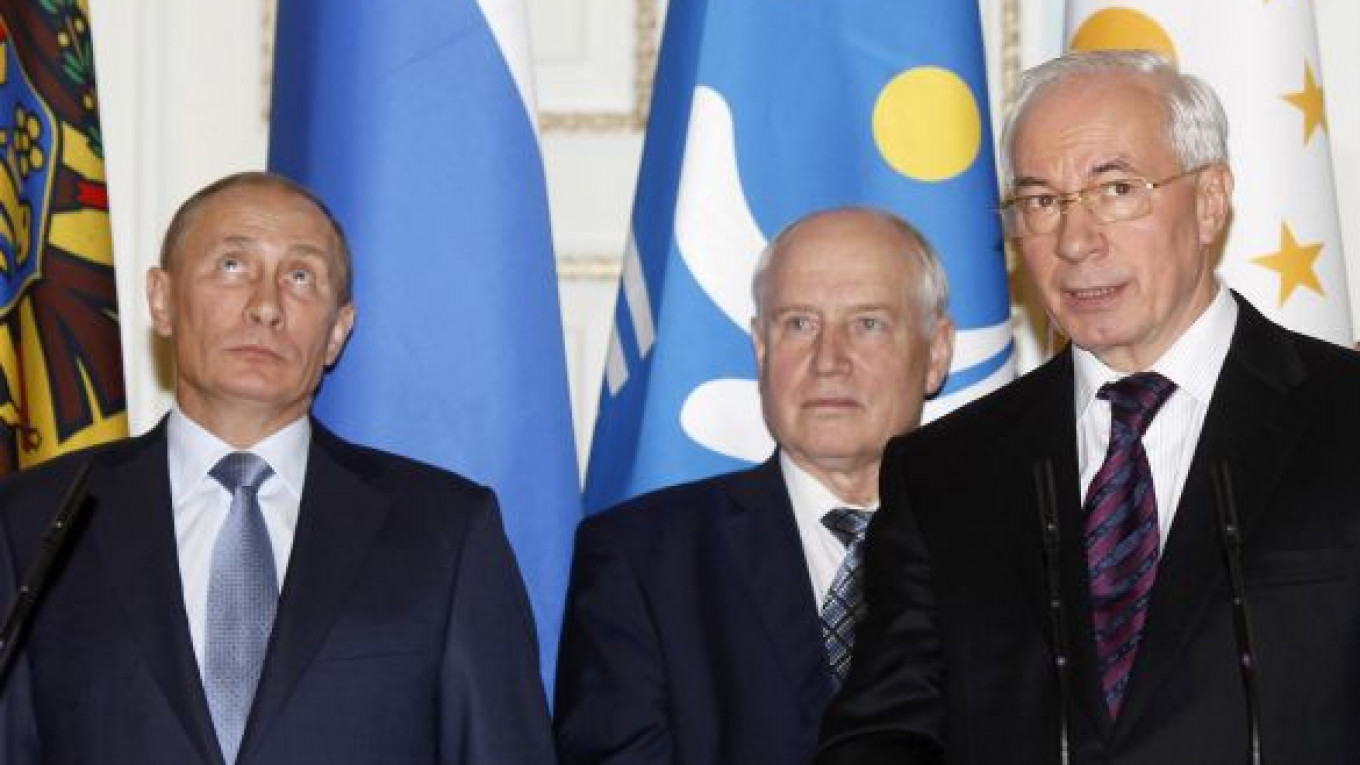Most former Soviet republics have signed a free-trade agreement that looks to increase mutual trade, especially between Russia and Ukraine, by removing some import and export duties.
Eight members of the Commonwealth of Independent States, a loose group of 11 former Soviet republics, agreed to the deal at the meeting of their prime ministers in St. Petersburg that ended late Tuesday.
Ukraine has backed the pact, pulling it closer to Russia, after fraying ties with the European Union by prosecuting former Prime Minister Yulia Tymoshenko, a political rival of its President Viktor Yanukovych.
"We are mutually opening the markets for our goods," Prime Minister Vladimir Putin said. "It means that goods will come to our markets at lower prices.
"This, in turn, means easier conditions for creating new cooperating enterprises. All this, no doubt … increases the competitiveness of our economies."
The members of the free-trade space are not planning to publish the full agreement or specify what goods will enjoy exemptions from duties "as yet," Putin's spokesman Dmitry Peskov said Wednesday. But the prime ministers broadly agreed on the goods, he said.
The other signatories of the free-trade deal include Belarus and Kazakhstan, which had already joined a customs union with Russia, a tighter group with no customs clearance at their internal borders.
Armenia, Moldova, Kyrgyzstan and Tajikistan comprise the rest of the new free-trade bloc that could start functioning next year, if ratified by the parliaments of the eight countries.
While total trade among the commonwealth members reached $134 billion in the first half of this year, business between Russia and the rest of the group accounts for almost half of that number.
Of the $60 billion in trade between Russia and the other 10 commonwealth members, $25 billion worth of goods traveled between Russia and Ukraine, according to the Federal Customs Service.
Russia and Ukraine are the main beneficiaries of the free-trade deal, said Volodymyr Fesenko, director of the Kiev think tank Penta. Ukraine pushed the hardest of all the signatories for the agreement, he said.
For Kiev, improving economic ties both with the European Union and Russia was an alluring goal, he said. Now that Kiev received a battering at the hands of the EU and other Western governments for its treatment of Tymoshenko, Russia is making a show of being an accomodating partner, Fesenko said.
"There's a contrast effect to Ukraine's relations with the European Union," he said.
Russia's longer-term goal remains to convince Ukraine to join the customs union, a prospect that Ukraine insisted would contradict its obligations as member of the World Trade Organization, the global trade arbiter, Fesenko said.
Ukraine's Prime Minister Mykola Azarov, however, said Wednesday that he ordered the government to consider the possibility of observing the technical standards of the customs union.
Vladimir Zharikhin, deputy director of the CIS Institute, a think tank that studies the commonwealth, described the free-trade zone as an "anteroom" for the customs union.
The free-trade agreement complies with WTO rules, Putin said. In addition to Ukraine, the other WTO members of the free-trade agreement are Moldova, Kyrgyzstan and Armenia.
Azarov said Tuesday that the agreement stipulates a time frame to remove all import and export duties within the free-trade space over time.
Azerbaijan, Turkmenistan and Uzbekistan will consider joining the free-trade agreement before the end of the year, Putin said.
The Eurasian Economic Community is considering releasing a second $445 million tranche of a $3 billion bailout loan for Belarus, Prime Minister Vladimir Putin said, urging Belarus to comply with the terms of the loan program, Interfax reported. Belarus has already received a $800 million tranche of the loan, which comes from the EurAsEC Anti-Crisis Fund.
"I would like to draw your attention to the fact that the terms of the loan, which have been agreed on with the Belarussian side, should be complied with," Putin said at a prime ministerial meeting of the EurAsEC Interstate Council. "This is not easy, but they [the terms] have to be complied with to ensure effective use of these resources."
Belarussian Prime Minister Mikhail Myasnikovich said: "everything will be complied with in accordance with the algorithm that has been agreed on."
A Message from The Moscow Times:
Dear readers,
We are facing unprecedented challenges. Russia's Prosecutor General's Office has designated The Moscow Times as an "undesirable" organization, criminalizing our work and putting our staff at risk of prosecution. This follows our earlier unjust labeling as a "foreign agent."
These actions are direct attempts to silence independent journalism in Russia. The authorities claim our work "discredits the decisions of the Russian leadership." We see things differently: we strive to provide accurate, unbiased reporting on Russia.
We, the journalists of The Moscow Times, refuse to be silenced. But to continue our work, we need your help.
Your support, no matter how small, makes a world of difference. If you can, please support us monthly starting from just $2. It's quick to set up, and every contribution makes a significant impact.
By supporting The Moscow Times, you're defending open, independent journalism in the face of repression. Thank you for standing with us.
Remind me later.






